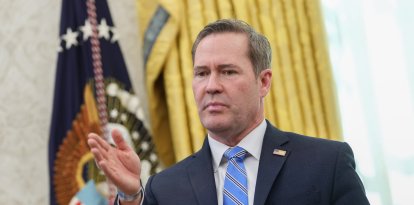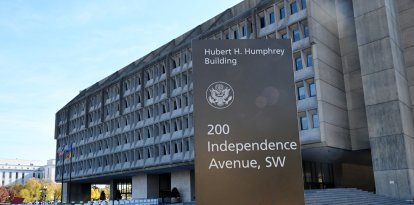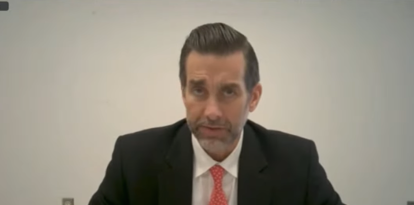Maná removes its song with Nicky Jam from platforms after his support for Donald Trump, accusing him of racism
The controversial band reported that it had removed the remix of "De Pies a Cabeza" (2016), saying it "does not work with racists" and that it did so to defend "the rights of Latinos in the world."

Fher Olvera of the band Maná
"Maná does not work with racists." With those words, the iconic Mexican band announced that it had withdrawn its track with Nicky Jam from digital platforms after the latter endorsed Donald Trump over the weekend.
The collaboration with Nicky Jam is a remix of the band's song "De Pies a Cabeza." Released in 2016, it reached No. 1 on Billboard's Latin Airplay chart. It is still available on platforms such as YouTube, albeit on unofficial accounts.

Politics
Trump says he hates Taylor Swift just days after she announced her endorsement of Kamala Harris
Sabrina Martin
"For the past 30 years, Maná has supported and defended the rights of Latinos around the world," the band wrote to announce the track's removal. "There is no business or promotion that is worth more than the dignity of our people."
" style="color: #c9c8cd; font-family: Arial, sans-serif; font-size: 14px; font-style: normal; font-weight: normal; line-height: 17px; text-decoration: none;" target="_blank">
Over the years, Maná has proven to be a fervent supporter of the Democratic Party. During recent decades, they have successively supported the candidacies of Barack Obama, Joe Biden and now Kamala Harris.
Their political activism has not been exempt from controversy, such as the anger that their singer, Fher Olvera, aroused among the Hispanic community for wearing a T-shirt featuring guerrilla leader Ernesto "Che" Guevara during a concert in Los Angeles. Images of this concert are still available on the band's official social media pages:
" style="color: #c9c8cd; font-family: Arial, sans-serif; font-size: 14px; font-style: normal; font-weight: normal; line-height: 17px; text-decoration: none;" target="_blank">
Internet users recalled this episode after Maná spoke out against Nicky Jam, saying it was hypocritical that the band supposedly repudiated racism but its singer proudly wore a shirt of the "murderer and homophobe" Che Guevara, as reporter Esteban Hernandez wrote, for example. Others put the spotlight on the fact that the artist apparently chose that image to protest Trump's immigration policy, when the Argentine was one of the fathers of the Cuban regime that led to the Cuban exodus.
The group also came under fire for its vocal support of Subcomandante Marcos, leader of Mexico's Zapatista Army of National Liberation.
RECOMMENDATION





















